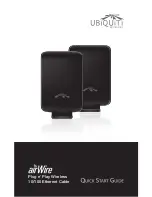
– 29 –
4
Wireless Settings
This chapter describes wireless settings on the access point. It includes the
following sections:
◆
◆
“Advanced Settings” on page 32
Basic Settings
The IEEE 802.11 wireless interfaces include configuration options for radio signal
characteristics and wireless security features.
The access point can operate in several radio modes, 802.11a/n/ac (5 GHz) or
802.11b/g/n (2.4 GHz). Note that dual-band access points can operate at 2.4 GHz
and 5 GHz at the same time. The web interface identifies the radio configuration
pages as:
◆
Ath0 - 2.4G
— the 2.4 GHz 802.11b/g/n radio interface
◆
Ath1 - 5G
— the 5 GHz 802.11a/ac/n radio interface
Each radio supports 8 virtual access point (VAP) interfaces based on the SSIDs,
referred to as VAP 0 ~ VAP 7. Each VAP functions as a separate access point, and can
be configured with its own Service Set Identification (SSID) and security settings.
Traffic to specific VAPs can be segregated based on user groups or application
traffic. The clients associate with each VAP in the same way as they would with
separate physical access points. The AP supports up to a total of 127 wireless clients
across all VAP interfaces per radio.
The basic configuration settings for the radios are shown on the Basic page. To
select 5G and 2.4G radios, click the Ath0 - 2.4G or Ath1 - 5G tab.
Figure 12: Basic Radio Configuration Status
Summary of Contents for ECW5212
Page 8: ...Figures 8...
Page 9: ...9 Tables Table 1 Radio Channels 33 Table 2 Troubleshooting Chart 43...
Page 10: ...Tables 10...
Page 12: ...12 Section I Getting Started...
Page 22: ...Chapter II Web Configuration 22...
Page 26: ...Chapter 2 Status Information Wireless Overview 26...
Page 40: ...Chapter 5 System Settings Maintenance 40...
Page 42: ...42 Section III Appendices...
Page 44: ...Appendix A Troubleshooting Using System Logs 44...
Page 47: ......
















































